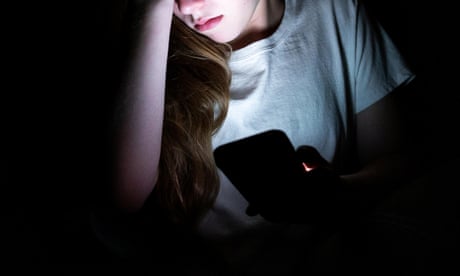- by foxnews
- 08 Apr 2025
‘Urgent need’ to understand link between teens self-diagnosing disorders and social media use, experts say
‘Urgent need’ to understand link between teens self-diagnosing disorders and social media use, experts say
- by theguardian
- 09 Jan 2023
- in news

There is an "urgent need" to investigate the increasing number of children and teenagers self-diagnosing with neurological conditions, mental illnesses and personality disorders, a trend being driven by social media and difficulty accessing healthcare, psychiatrists and paediatricians say.
A paper published in January in the journal Comprehensive Psychiatry describes how prolonged social media use, especially on video-sharing platforms including TikTok, is exposing young people to a growing number of content creators making videos about their self-described tics, Tourette syndrome and other self-diagnosed disorders.
"This uptick has coincided with increasing numbers of youth who have presented to clinical providers or psychiatric services during the Covid-19 pandemic with what have been termed functional tic-like behaviours," says the paper, led by Dr John Haltigan from the University of Toronto's psychiatry department.
"An increasing number of reports from the US, UK, Germany, Canada and Australia have noted an increase in functional tic-like behaviours prior to and during the Covid-19 pandemic, coinciding with an increase in social media content related to Tourette syndrome and tics. Similar phenomenon has also been recently chronicled with respect to dissociative identity disorder."
Tourette syndrome is a complex disorder characterised by repetitive, sudden and involuntary movements or noises called tics. The paper says the modern functional tic-like behaviours young people are presenting to their doctors differ from classic Tourette syndrome.
These young people are presenting later in childhood and their tics often predominantly affect the upper limbs, "with complex movements of the arms and hands, including clapping, sign language, throwing objects, banging oneself on the chest, head or thigh, or hitting other people", the paper says.
They also describe being affected by vocal tics including involuntarily speaking random words, phrases or offensive statements, whereas less than 15% of those diagnosed with Tourette syndrome ever develop these. Young people are sharing videos of themselves while experiencing these tics, tagging their posts with labels such as #tics and #TS.
The authors of the paper conclude there "is an urgent need for focused empirical research investigation into this concerning phenomenon that is related to the broader research and discourse examining social media influences on mental health". The phenomena largely affects adolescent females, a core user group of TikTok, the paper says.
A psychiatrist and the executive director of Orygen youth mental health service, Prof Pat McGory, said it was important to note that just because some of the teens were sharing their self-diagnoses and presenting to doctors, it does not mean they aren't suffering.
"There has been a huge uptick in depression and anxiety worldwide following the pandemic, and that's particularly pronounced in young people," he said. "This self-diagnosing isn't just some kind of epidemic of attention-seeking or mass hysteria. There is a surge in young people suffering from genuine serious conditions like eating disorders, obsessive-compulsive disorders and self-harming."
He said children and teens may be driven online to comprehend how they're feeling because of the difficulty in accessing affordable, bulk-billed GP appointments and long wait lists for expensive psychiatrist consultations.
"They're just looking for answers as to why they're not feeling OK and they have suffered extraordinary challenges with lockdowns and the pandemic."
Research would also help identify the reasons behind youth self-diagnosing and why some are influenced more easily, the paper said. Other possibilities raised by the authors is that those affected are trying to seek affirmation and attention, acquire social capital in online communities, or maintain an unconventional identity "that masks feelings of anxiety, depression, and possibly lower self-esteem".
Videos on social media with hashtags such as #DID [dissociative identity disorder], #borderlinepersonalitydisorder and #bipolardisorderhave have received millions of views, the paper says, many of these videos showing the creator switching personality. The creators often comprehensively describe each unique personality - often referred to as an "alter" - along with the names and characteristics of each alter.
A paediatrician working in Melbourne, who cannot be named to protect the confidentiality of her patients, said there has been a noticeable increase in children and teenagers self-diagnosing.
She said while some cases did go on to have the illness described, most did not. It was a fine balance between ensuring the patient feels heard, while also making sure they were not inappropriately diagnosed, as a diagnosis often came with prescriptions that carry side-effects and costly treatments.
"The thing is, often with these self-diagnosed disorders and tic disorders, there is an underlying anxiety or depression there that is probably the root cause of whatever is going on," she said. "And maybe that root cause is manifesting in this way because they've seen it on TikTok."
Do you know more? melissa.davey@theguardian.com
- by foxnews
- descember 09, 2016
Ancient settlement reveals remains of 1,800-year-old dog, baffling experts: 'Preserved quite well'
Archaeologists have recently unearthed the remarkably well-preserved remains of a dog from ancient Rome, shedding light on the widespread practice of ritual sacrifice in antiquity.
read more


